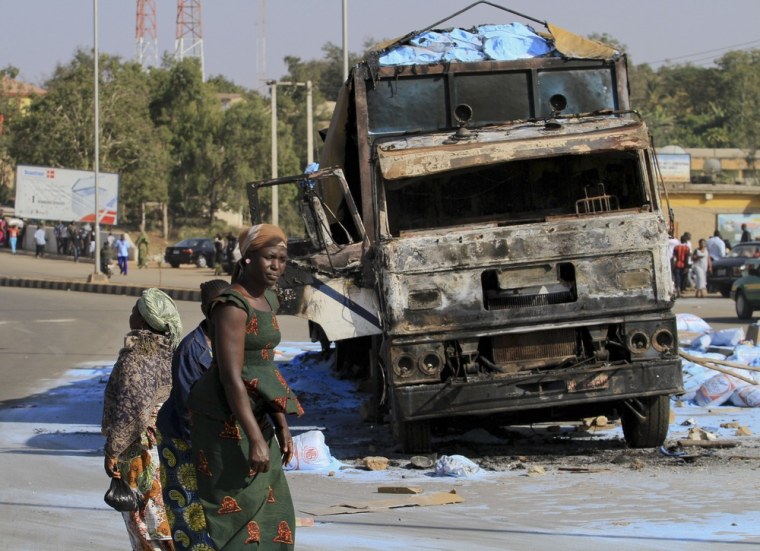Explosions in Nigeria's central region killed 32 people on Christmas Eve and six people died in attacks on two churches in the northeast of Africa's most populous nation, officials said on Saturday.
On Friday night, a series of bombs were detonated during Christmas Eve celebrations in villages near the central city of Jos, killing at least 32 people while 74 were in a critical condition, the state police commissioner said.
Religious violence has claimed over 500 lives this year in Jos and neighboring towns and villages, but the situation was believed to have calmed down.
Nigeria, a country of 150 million people, is almost evenly split between Muslims in the north and the predominantly Christian south. The blasts happened in central Nigeria, in the nation's "middle belt," where dozens of ethnic groups vie for control of fertile lands.
The violence, though fractured across religious lines, often has more to do with local politics, economics and rights to grazing lands. The government of Plateau State, where Jos is the capital, is controlled by Christian politicians who have blocked Muslims from being legally recognized as citizens. That has locked many out of prized government jobs in a region where the tourism industry and tin mining have collapsed in the last decades.
"What has happened on the eve of Christmas is unfortunate, especially at this time when we want to ensure peace and security in the state," said Gregory Yenlong, the state commissioner for information. He said that nobody had claimed responsibility for Friday's attacks in Jos.
This is the first major attack in Jos since the Plateau State government lifted a curfew on May 20. The curfew had first been imposed in November 2008 during postelection violence but it was extended in January following clashes between Christian and Muslim groups.
More than 300 people— mostly Muslim — were killed in the January violence in Jos and surrounding villages.
The curfew improved the security within a city that has hosted numerous peace conferences to address the violence but the killings continued outside.
Twelve people were gruesomely murdered in March in a small Christian village, attackers cutting out most of their victims' tongues and there are still regular attacks outside Jos.
Pastor, choir members killed
Also Friday, six people died in attacks on two churches in Nigeria's northern region.
State Police chief Mohammed Abubakar said members of the Muslim sect, Boko Haram, attacked two churches at opposite ends of Maiduguri, the capital of Borno state, late Christmas Eve.
Maiduguri is about 320 miles northeast of Jos. The attacks in both cities have not been linked, but Boko Haram was first based in the city of Bauchi, only 75 miles from Jos, before moving its operations to Maiduguri.Danjuma Akawu, secretary of Victory Baptist Church said about 30 men attacked his church on Christmas Eve, killing five people, including the pastor, two choir members rehearsing for a late-night carol service and two passersby who were attacked by the mob.
Akawu, who escaped with other witnesses after climbing the church fence, said that the mob was armed with guns, knives and Molotov cocktails.
He said the attackers came in three cars and dragged the pastor out of his house within the church premises before shooting him to death. They drove off after setting the church and pastor's house ablaze.
At the opposite end of the city, Rev. Haskanda Jessu of Church of Christ in Nigeria said that three men attacked his church an hour later, killing a 60-year-old security guard. The church was empty at the time of the attack. Jessu said the attackers were armed with rifles.
Police have not made arrests but accuse Boko Haram members of a rash of targeted killings in recent months during which more than 30 people have been killed including police officers, soldiers, political and spiritual leaders.
Boko Haram means "Western education is sacrilege" in the Hausa language. Its members re-emerged recently after starting a July 2009 riot that led to a security crackdown that left 700 people dead.
The Christmas Eve killings in Jos and Maiduguri add to the tally of thousands who already have perished in Africa's most populous country in the last decade over religious and political frictions.
Political element
The attacks come at a difficult time for President Goodluck Jonathan, who is in running a controversial campaign ahead of the ruling party's primaries on Jan. 13.
A ruling party pact says that power within the People's Democratic Party (PDP) should rotate between the mostly Muslim north and largely Christian south every two terms.
Jonathan is a southerner who inherited office when President Umaru Yar'Adua, a northerner, died during his first term this year and some northern factions in the ruling party are opposed to his candidacy.
Jonathan faces a challenge from former Vice President Atiku Abubakar for the ruling party nomination, and some fear any unrest in Africa's most populous nation will be exploited by rivals during campaigning.
"What happened (in Jos) was not religious it was political ... the aim of the masterminds is to pit Christians against Muslims and start another round of violence," the governor of Plateau state said.
